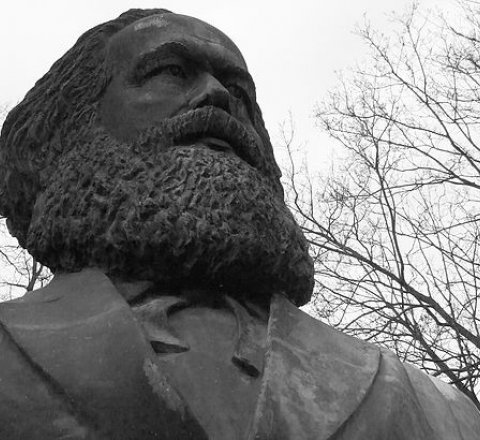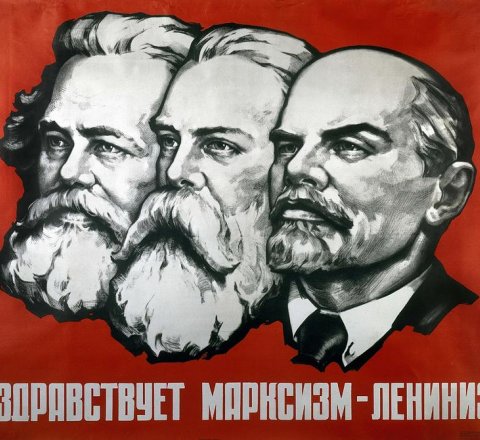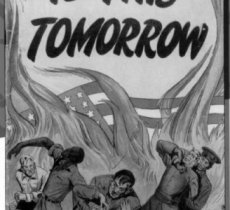What is communism? Many think it is the end of the world as we know it, and they may very well be right. But that's not necessarily a bad thing. Sure, replacing a $16 trillion debt with Stalin is probably a bad trade and it will probably remain a bad trade no matter how high the debt. But despite the McCarthyian propaganda sold by radical neo-conservatives, Christian fundamentalists, and corporate-biased 24-hour news channels, communism is not Stalinism nor any of the other so-called forms it took in the twentieth century. It is more than just a "good theory" and it is surely not, as the religious neo-cons espouse, "godless and evil." Communism is a recurring aspect of human history that has typically served societies, when practiced in its true form, more peace and happiness than blood-stained dollar bills. And this "theory" can very well become a part of the American society when it is properly understood.
The fact is that communism is not a hammer and sickle, but a system that allows true individual self-actualization through communal living and self-sufficiency not by individual workers working to make corporations lots and lots of money, but a collectivist effort to work for each other together as equals with no class distinctions.
In this first part of what will become a six-part series, I will explore this notion of communism and explain how, when properly understood, the end of the world as we know it may become something we can all hope for. So let us begin with America's good friend Karl Marx, the so-called father of communism:
In Marx's writings, notably The Communist Manifesto, a 3-phase system for the progression of communism into its final form implicitly emerges.

Marx tells us that first, there must be a revolution of the workers against the capitalists followed by the emergence of a dictator whose role is to socialize the state and abolish private property so that, finally, the emergence of a classless communist utopia can emerge. Looking closely, Stalin, Mao, and all the other "communist" dictators seem to fit into the role of dictator seen in the second phase, but I'd be hard pressed to find anyone who could call their actions steps toward utopia. The truth is they used Marx's writings only as inspirations to create their own evil kingdoms, kingdoms Marx would abhor. For this, Soviet Russia and "Communist" China never actually reached Marx's standard of true communism. And, truly, no country probably ever will. After all, I'm not so sure we'll ever find a benevolent dictator who will wish for any utopia for his people. They seem to unanimously enjoy using their iron fist for genocide and indoctrination.
But aside from this faulty system, Marx's critiques of capitalism are still very pertinent today and can explain the true destructive, harmful inequality American corporatocracy creates. But to accurately apply these critiques concerning the worker as the commodity of the capitalist and his alienation from humanity, we must move away from Marx's violent uprising of the workers. After all,
"violence only begets more violence" and as a result, communism must come from peace, not violence and the Occupy Movement, though it does not call itself communist, exemplifies the communist ideal beautifully with its belief in the economic equality for all and the end of the class-struggle. As well, the Occupiers gather together in communities worldwide sharing what each other have just like in any true communist society. But they do still maintain their role in the capitalist society and perhaps could learn a little something from those smelly hippies who decided to pack up their bags and get out. Blending the ideas of both the Occupiers and the hippies may very well be a good starting point for American communism.
This emergence from capitalism into communism can only function, however, if there is a certain morality of communism and it cannot be the selfish morality of the corporation and capitalist America, but a productive morality that encourages the self-actualization, not the subjugation, of each individual in order to create a community of people who work together rather than work to kill each other.
In essence, this morality must do away with the individualistic, self-seeking, harmful, and ultimately destructive morality of capitalism and corporatocracy and embrace something new, something better. For this, we turn to Jesus whose teachings, both directly and indirectly, and the very life he lived are espousals of communist principals. Neither he nor his disciples lived within the money-hungry Jewish society in Israel, but lived together communally even after Jesus was gone. Jesus himself even told those who came to him to sell all they had and give to those in need. Jesus Christ may very well have been a communist and perhaps the title "Father of Communism" should have been placed over his head as he hung on the cross rather than the cliché "King of the Jews." And surely, if Jesus was God and God wants his children to live, flourish, and work together, God would be a communist as well.
And ultimately, this is communism in a nutshell: the existence of communities enabling self-actualization of all members to further create a peaceful and flourishing collectivist society.
When put that way, it appears much better than the capitalist class-struggle with the lowest classes struggling for employment and often finding themselves forced into criminality or beggary to avoid starvation. It is also apparently better than Soviet Russia and "Communist" China which were stifled from becoming true forms of communism by their dictatorial leaders
But that's it for this introduction. Stay tuned for our next article where Marx's anti-capitalist critiques discussed briefly above will be applied in more detail to American corporatocracy. And be prepared for the end of the world as we know it.


